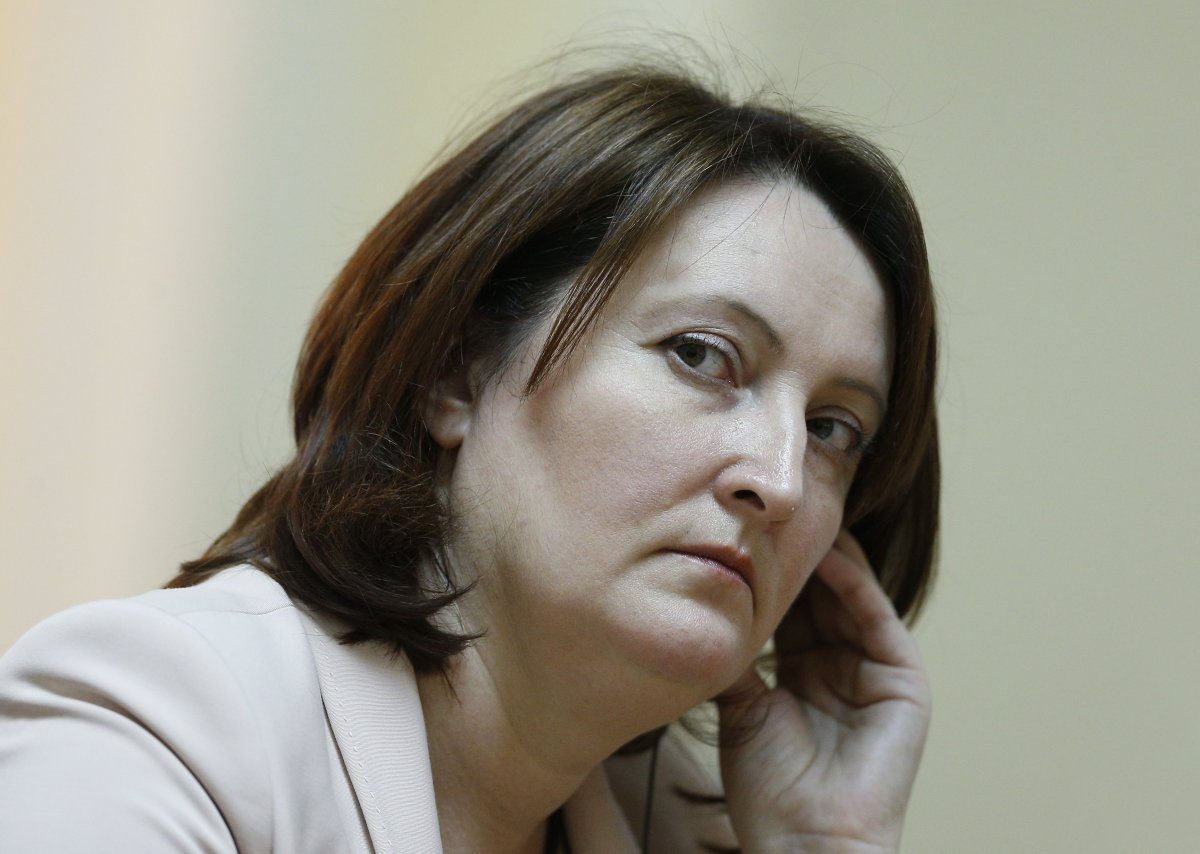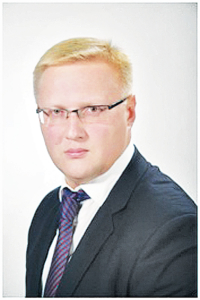One of Ukraine’s most highly touted corruption-fighting tools — the legal requirement that hundreds of thousands of public officials declare their incomes and assets — may be riddled with corruption itself.
At least that’s the blockbuster accusation made by Hanna Solomatina, a top official of the National Agency For Preventing Corruption, which is responsible for verifying the public declarations.
Solomatina, head of the NAPC’s department for financial and lifestyle monitoring, on Nov. 14 said the agency is controlled by President Petro Poroshenko.
Solomatina said the agency and its head, Natalia Korchak, are involved in massive corruption and forgery involving the 1.5 million financial declarations from 800,000 public officials.
The aim of the falsification, Solomatina alleged, is to protect top incumbent officials from scrutiny and possible criminal charges. Moreover, Solomatina alleged, the declarations of Poroshenko’s foes were singled out for investigation by law enforcement officials.
Additionally, Solomatina accused Korchak and other officials of soliciting bribes to ensure that some officials’ disclosures were investigated, while others were not.
Agency denies charges
The agency denied the accusations and said it would take the highly unusual step of filing a libel lawsuit against Solomatina.
There is also dispute over her status. Solomatina said she had resigned, then withdrew her resignation and still works there. The agency said she has been fired and does not work there.
“The ex-official’s information lacks any specific facts and is a personal attack on (the NAPC’s) chief and members of the agency’s collective leadership, and is an effort to discredit a successful anti-corruption reform in Ukraine,” the agency said.
The Presidential Administration also denied the accusations, saying it “lacks any effective tools to influence the NAPC.”
Solomatina on Nov. 15 showed documents that she says support her accusations.
The National Anti-Corruption Bureau of Ukraine, which has enjoyed a reputation as an independent law enforcement agency, started a criminal investigation into them.
Covers & crackdowns
“The electronic declaration system is being used to cover for officials loyal to the authorities, for crackdowns on dissidents, and for the personal enrichment of the NAPC’s chief and members of the NAPC’s collective leadership,” she said. “The NAPC is not an independent agency — it is completely controlled by the government.”
Solomatina’s accusations were backed up on Nov. 15 by two other top officials of the agency, and some NAPC ex-top officials also confirmed part of them.
The NABU is also investigating another corruption case against Korchak. She is accused of failing to declare a Skoda Octavia A7 car.
The NAPC has so far failed to pursue cases against any major bureaucrats or politicians.
The agency has found punishable violations only in several minor officials’ electronic asset declarations, including the mayor of a small city, while claiming that not a single minister or top official had violated the asset declaration law.
Massive violations
Oksana Dyvnych, head of the NAPC’s internal audit unit, confirmed Solomatina’s claims on Nov. 15.
Solomatina said that Vadym Nikolayev, head of the corruption prevention unit, was also ready to testify in support of her accusations.
Some of their accusations have also been confirmed by the NAPC’s ex-chief of staff Ihor Tkachenko, and two ex-members of the NAPC’s collective leadership — Ruslan Radetzky and Rouslan Riaboshapka.
The Poroshenko Bloc, the People’s Front and three offshoots of ex-President Viktor Yanukovych’s Party of Regions — the People’s Will, Renaissance and the Opposition Bloc — blocked the consideration of Solomatina’s accusations at a meeting of parliament’s anti-corruption committee on Nov. 15.
Solomatina and Dyvnych said they had carried out an internal audit of the NAPC and found evidence of large-scale crimes and corruption.
Solomatina said that both conclusions on the asset declarations of those applying for jobs, and those on incumbent officials’ declarations, had been falsified. The falsified conclusions were signed by NAPC top official Radetzky, who denied any wrongdoing, according to Solomatina.
She said she has sometimes found two or three different conclusions for one official’s declaration, i. e. at least one of them had been falsified.
In some cases, information from government registers did not coincide with the information in asset declarations, Solomatina and Dyvnych said. For example, an official’s income in the tax records might exceed their declared income by “millions of dollars” but the results of a declaration check did not show it, Solomatina said.
Meanwhile, Radetzky said on Nov. 14 that the NAPC’s ex-chief of staff Tkachenko “gave orders to falsify documents on declaration checks.”
Tkachenko denied the accusations.
Solomatina also said that the NAPC’s leadership had prevented a special commission from checking the declarations of candidates for Supreme Court jobs during the recent competition, in an apparent attempt to cover up for political loyalists.
Poroshenko on Nov. 10 appointed to the Supreme Court 25 judges who have ill-gotten wealth, participated in political cases, made unlawful rulings or are under investigation in graft cases, according to the Public Integrity Council, a civil-society watchdog.
Solomatina also told the Ukrainska Pravda newspaper that top NAPC officials had been bribed to prepare positive conclusions on declarations.
Naming names
She said that Korchak had told her to prepare “positive” conclusions on the asset declarations of Boryslav Rozenblat from the Poroshenko Bloc and Volodymyr Bandurov from the People’s Will faction, but that she had refused.
In many cases, the NAPC missed deadlines for declaration checks and did not carry out any activities or send any requests to actually check those declarations, Solomatina and Dyvnych said.

Natalia Korchak, head of the National Agency for Preventing Corruption. (UNIAN) (source)
These include the declarations of lawmaker and Radical Party leader Oleh Lyashko; Radical Party lawmaker Andriy Lozovy; lawmakers Nestor Shufrich and Yevhen Balytsky, members of the Opposition Bloc faction; and lawmaker Olena Sotnyk from the Samopomich party, they said.
Others whose deadlines were missed include Finance Minister Alexander Danylyuk, and Svitlana Pavlyuk, a top official of the State Judicial Administration, they said.
Meanwhile, the declarations of Deputy Prime Minister Hennady Zubko and Youth and Sports Minister Ihor Zhdanov were checked incorrectly — information in government registers did not coincide with declared information — but this was ignored by the NAPC, Dyvnych told the Kyiv Post.
Ex-NAPC official Riaboshapka told the Kyiv Post that there had been enough grounds for sending information on several ministers to the National Anti-Corruption Bureau for potential criminal cases, but the agency had failed to do so.
A source close to the NAPC told the Kyiv Post that one of the ministers is Energy Minister Ihor Nasalik. He spoke on condition of anonymity for fear of reprisals.
The NAPC also failed to check a Radio Liberty investigation according to which Prime Minister Volodymyr Groysman lives in his mother-in-law’s high-end Kyiv apartment, which he has failed to declare, Sasha Drik, head of the Declarations Under Control civic watchdog, told the Kyiv Post.
Groysman denies the accusations of wrongdoing.
In its decision on Groysman’s declaration, the agency said that he had failed to declare Hr 80,000 ($3,085) in expenses on his work as speaker of the Verkhovna Rada in 2015, but subsequently the agency decided that he had not been required to declare it, Drik added.
The agency also said that it had heard Groysman’s explanations in 2015 about cash he declared in various currencies worth about $1.5 million, but did not indicate what these explanations had been, according to Drik.
Meanwhile, in August the NAPC said it had found no violations in Poroshenko’s asset declarations, paying no attention to his undeclared Spanish villa, and completed checking them without even discussing the issue. Parliament’s anti-corruption committee has stated that Poroshenko was required to declare the villa since it is for his personal use, while the president said he did not have to declare it.
Political influence

Oleksiy Gorashchenkov, a Presidential Administration official accused of influencing the NAPC. (Courtesy)
Solomatina said that in September Tkachenko invited her to meet Oleksiy Gorashchenkov, the first deputy chief of the Presidential Administration’s department for strategic planning and operating support and a member of the commission for choosing NAPC officials.
Tkachenko and Ruslan Kovalyov, the head of the NAPC’s human resources department, were present at the meeting, Solomatina said. Tkachenko confirmed to the Kyiv Post that he had participated in the meeting.
She said Gorashchenkov had told her that electronic asset declaration checks and their results had to be approved by the Presidential Administration. She refused to comply with the demand.
Gorashchenkov denied influencing the NAPC, but refused to say whether he had met her.
Solomatina also told Ukrainska Pravda that Gorashchenkov had regularly met with Korchak, Oleksandr Skopych, a member of the NAPC’s collective leadership, and Oleksandr Pysarenko, the NAPC’s acting chief of staff and head of its conflicts of interest department.
Riaboshaka also said on Nov. 14 on Facebook that the Presidential Administration has run the NAPC through Korchak, Tkachenko and Pysarenko, who deny the accusations of being presidential tools.
Solomatina also told Ukrainska Pravda that the NAPC had been ordered by the Presidential Administration to find violations in the declarations of associates of ex-Georgian President Mikheil Saakashvili, now a major opponent of Poroshenko.
Previously the NAPC has been accused of targeting Saakashvili associate Yulia Marushevska, reformist lawmaker Sergii Leshchenko and anti-graft activist Daria Kalenik for political reasons, which the NAPC denies.
The only solution to the NAPC mess is to guarantee the independent selection of the agency’s leadership, Drik told the Kyiv Post. A bill for that purpose has been submitted by lawmaker Viktor Chumak, but it has not been considered and is unlikely that it will be, she added.
